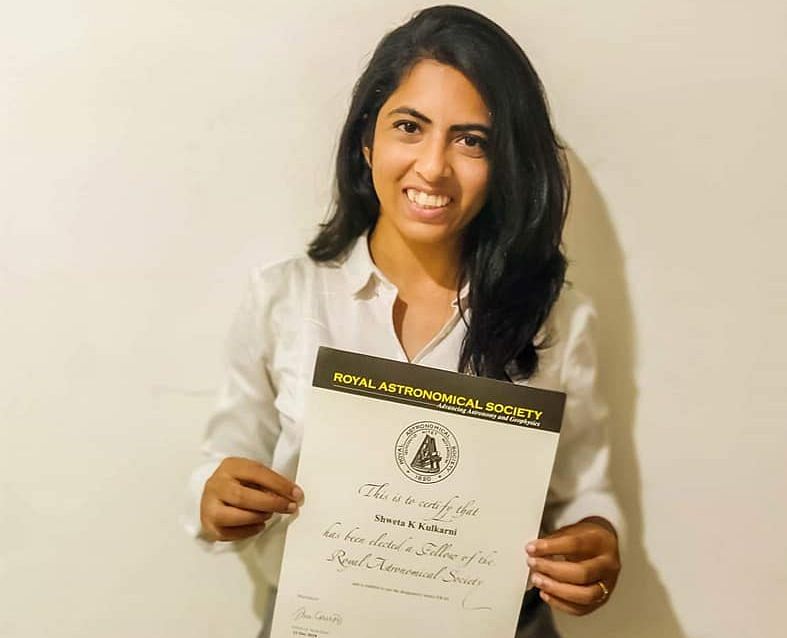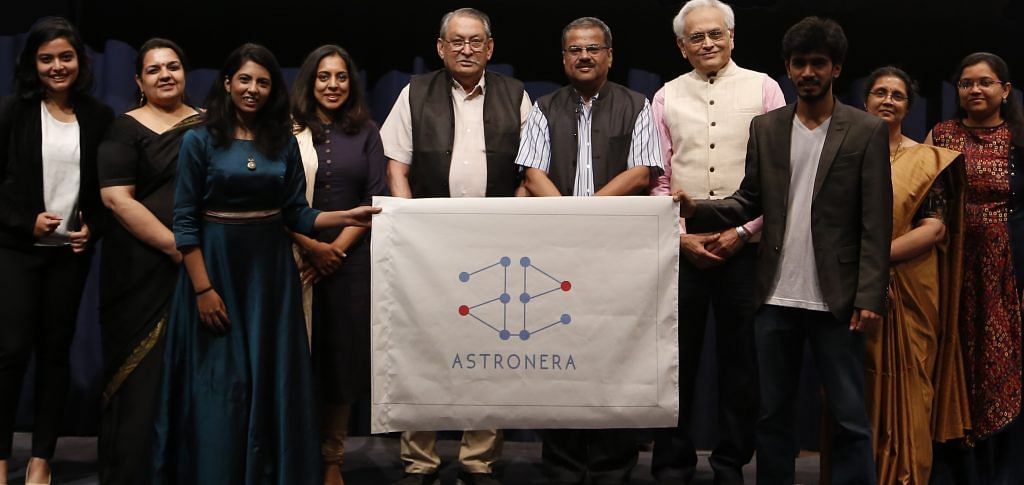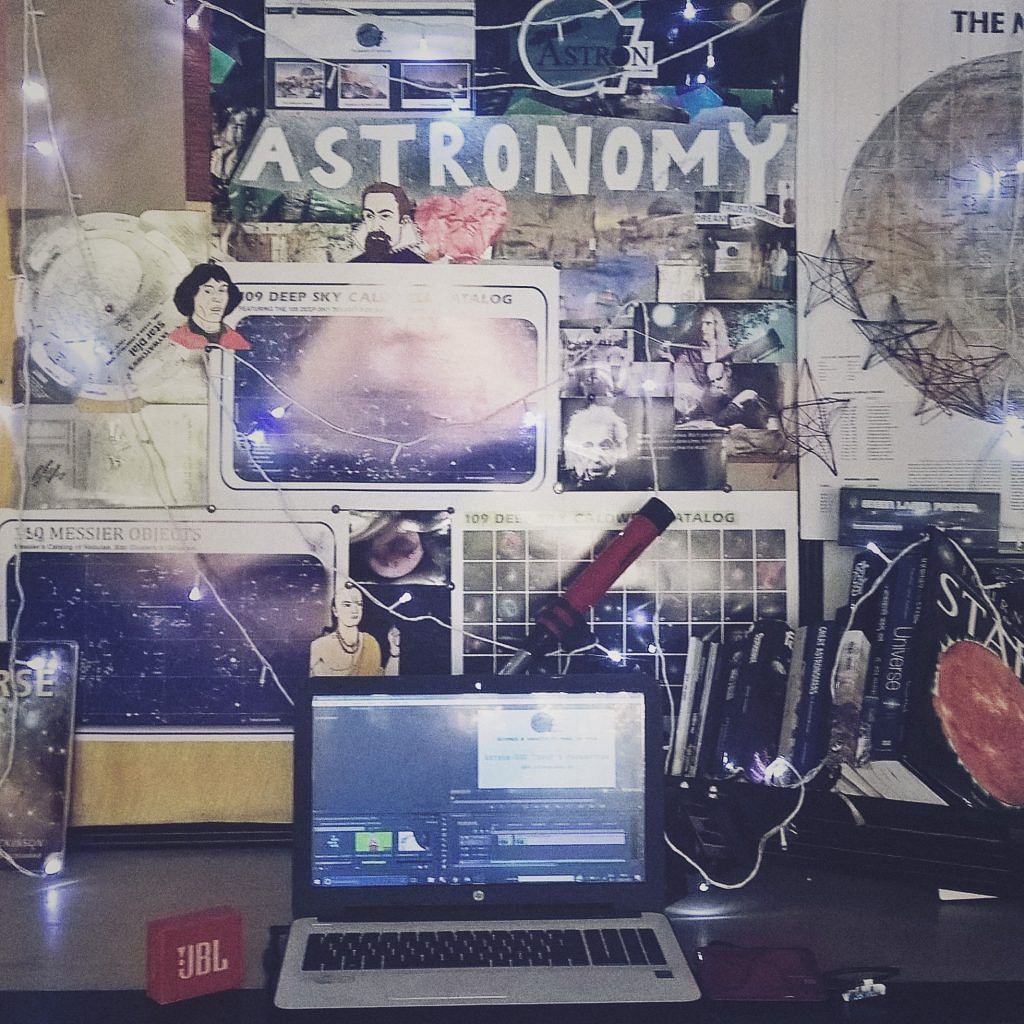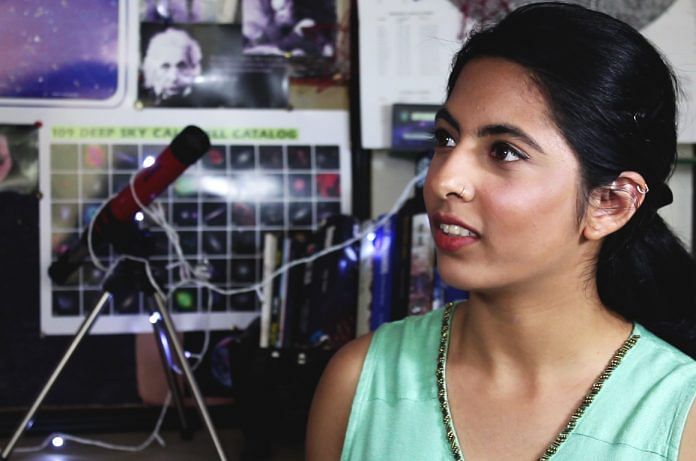Bengaluru: It’s not all too common for college undergraduates to become a fellow at the London-based premier Royal Astronomical Society (RAS). Late last year, Shweta Kulkarni, a 23-year-old undergraduate, became the first Indian woman to join the RAS as a fellow.
Her entry into the leading world organisation came on the back of her work with AstronEra, the world’s first astronomy focussed e-learning platform which she co-founded in 2015.
On Sunday, AstronEra will hold a public event, #AgeofAstron: Bangalore Edition, in Bengaluru. The free astronomy event, full with a moon-gazing session and a theatrical performance, will be held at the Indian Institute of Management-Bangalore (IIM-B).
As the young astronomer brings her e-learning platform to the Karnataka capital, ThePrint speaks to her about the genesis of AstronEra, her career in astronomy and more.

AstronEra
In her first year of college in 2014, physics student Kulkarni decided to register the name ‘Astron’ under a trust, a name she was using to conduct various astronomy-related educational outreach. She co-founded Astron-SHK along with her friend and collaborator, Nimish Aage, and then became the CEO of the company at 18 years of age.
Acknowledging her desire to work more on the company, she dropped out of college in Pune to perform astronomy outreach full-time.
Reflecting on her own past, when she enrolled in e-learning courses or Massive Open Online Courses (MOOC) online, she realised there were very limited courses focussed purely on astronomy on popular e-learning sites like Coursera and Udemy. So she decided to experiment with educational videos and set about attempting to procure funding.
So came about AstronEra, a company she started with Pradnya Vesikar, her former employee at Astron-SHK.
In 2015, Kulkarni and Aage wrote a proposal to the Department of Science and Technology under the Union government, for the company to produce educational videos for an online learning platform.

“This was the vision I had in my mind for AstronEra,” she explains. “I wrote all my concepts into a page and presented to DST.”
Kulkarni credits her application to DST and selection as one of the finalist proposals to the former director of Council of Scientific and Industrial Research (CSIR), Ramesh Mashelkar.
She lists Mashelkar as one of her mentors.
The AstronEra proposal was selected for a grant of Rs 2.5 lakh to produce five educational videos.
The AstronEra team was also the only one selected for the International Astronomical Youth Camp held in the UK. They then encouraged the duo to create courses as well, not just videos.
So they did and posted one on Udemy in 2017.
“We got an amazing response,” says an exhilarated Kulkarni. “More than 1,200 people enrolled in the course from over 80 countries. It was one of the top rated courses on Udemy.”
Also read: On International Day of Women and Girls in Science, remembering the 5 early pioneers
In early 2018, Kulkarni attended a ‘Women in Leadership’ summit at IIM-Bangalore, and it opened her eyes to the fact that she already was an astro-entrepreneur. She proceeded to apply to an incubation programme at IIM-Bangalore and got selected in a satellite centre at an incubator in IIM-Nagpur, upon which AstronEra was officially founded.
Childhood and inspiration
But her journey to this point wasn’t all that regular either.
Kulkarni grew up in Amravati and Nagpur in Maharashtra’s Vidarbha region. “My parents were very creative and also conscious about the environment, so I grew up with that energy around me,” she says.
“Best-from-waste was something my father was deeply interested in.”
When she moved to Pune at the age of 8, her parents almost home-schooled Kulkarni, but decided to enrol her in a Marathi medium school instead, wanting to provide her the ease of learning in her mother tongue and ensuring that her basic concepts in all subjects were clear.
And it worked, even if Kulkarni got bullied in school.
“As a result, I chose to spend a lot of time with myself, learning things on my own,” she says.
Her hours spent in the school library led her to science fiction books written by famed astronomer Jayant Narlikar.
“I wanted to meet him. So I went to a lecture of his and asked a very stupid question: is it possible that the universe exists inside a black hole,” she remembers fondly.
Narlikar told her that the universe consists of stars, and black holes themselves come from stars, so it’s unlikely that such a large number of stars live inside another star. Kulkarni credits this incident and Narlikar for her inspiration to enter the field of astronomy.
“I loved how creative his writing is and how passionate he is about science. It was in my 6th standard that I decided I wanted to study astronomy.”
In 11th standard, she persuaded her parents to buy her a telescope because she had already become a good stargazer and a permanent member in the local astronomy outreach meets. Kulkarni’s new 6-inch Newtonian reflector attracted a lot of people, especially during eclipses. Slowly, she started creating presentations for them, and eventually got around to organising events like overnight stargazing under the banner of ‘Astron’.
To study astronomy at any of the premier Indian colleges, Kulkarni needed to prepare for the infamous IIT-JEE. She wasn’t ready for this so she pivoted to doing a BSc in Physics in Pune. But she hated it.
Also read: Two Indian journalists are bringing the women of science to life
‘Abandoned my exam’
Kulkarni wanted to pursue Astron on the side and do her personal brand of astronomy outreach but her college was not supportive. Her first year exams coincided with a theatre performance at Columbo International Theatre Festival, for which she was selected.
“My parents told me that I can take the exam again but I won’t be able to perform at such a prestigious event again if I miss it, so I abandoned my exam and went,” she says gleefully.
As it happened, when the time came around for her to write those exams again, she had just procured an appointment with Govind Swarup, the “father of Indian radio astronomy” and the brains behind the Giant Metrewave Radio Telescope. So she again skipped her exam to keep up her meeting.
Kulkarni realised she saw no value in the quality of education she was receiving. She had enrolled in a bunch of online astronomy courses, all of which she exhausted quickly.

She then decided to enrol in a part-time, long-distance undergraduate program in astronomy with the University of Central Lancashire, and promptly dropped out of college and pushed herself into her pet projects full time.
The way to future
Kulkarni’s choice worked for her. She is at a university that approves and even supports her work with AstronEra. In fact, her fellowship came after she wrote to her tutor at the university about her work with AstronEra.
She was then encouraged to write to the Royal Astronomical Society.
Courtesy her tutor’s recommendation and her solid body of work, in October last year, she became the first Indian woman fellow of the society.
The RAS has a sum total of ten other fellows, including another female astronomer, Tarini Charan Panda from Ravenshaw University, and noted names like Jayant Narlikar.
For Kulkarni, though, this is only the beginning.
In another two years, the young student says with hope, she would earn a BSc in astronomy upon completion of her 18 modules spread out over eight years.
At 23, the young RAS fellow is one of those few who achieve professional success first and secure a college degree later.
This report has been updated to correct the year of Kulkarni’s college education.



